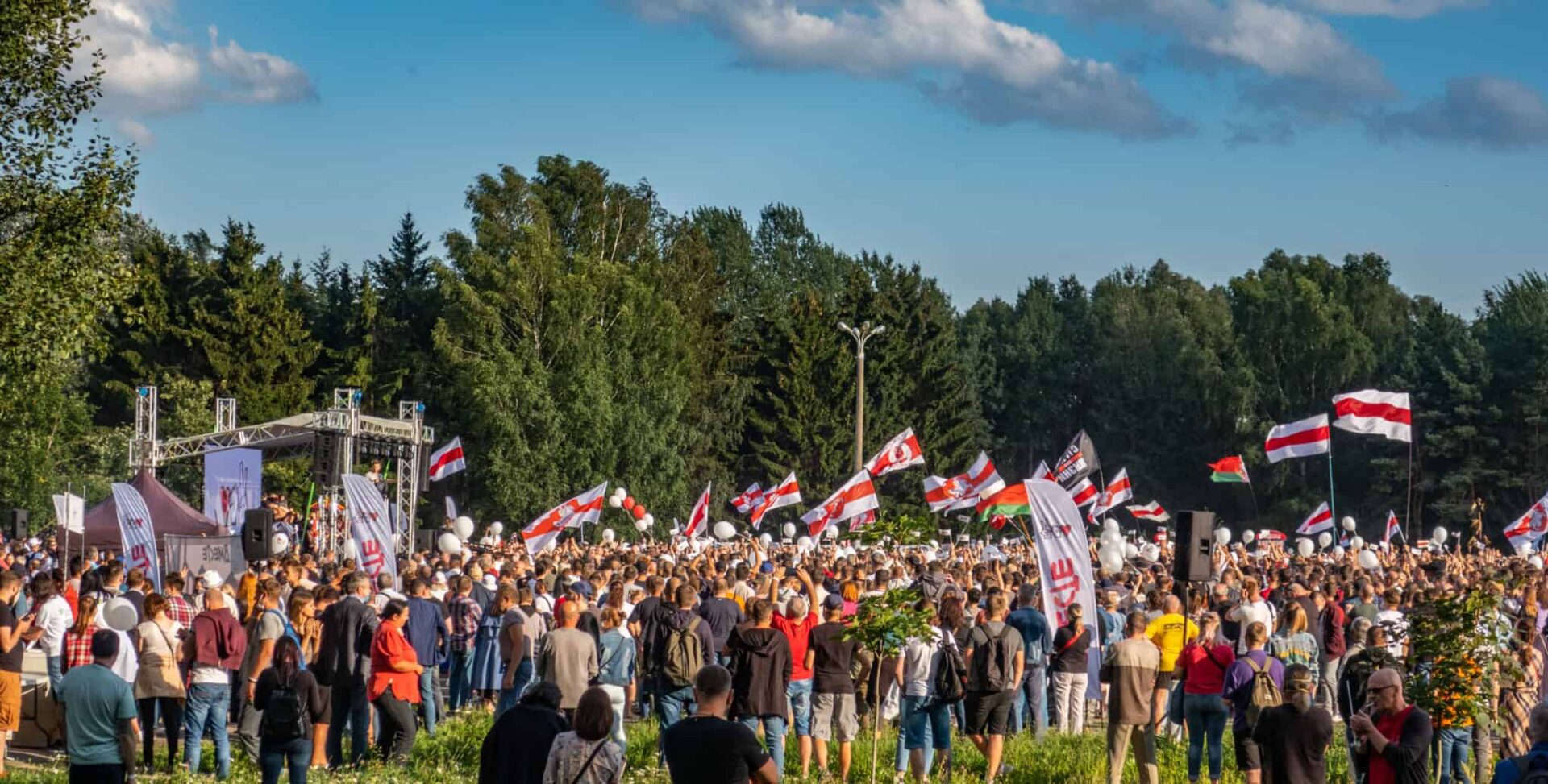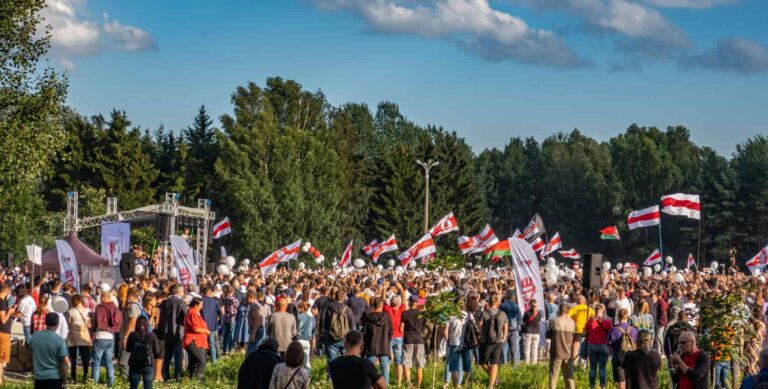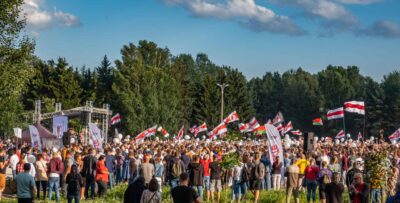The week of protests has shown that the situation is completely different than the well-known crises of the past
The revolution of Solidarity in Poland, the Czech Velvet Revolution, the Autumn of Nations in Europe, the colourful revolutions in Georgia, Kyrgyzstan, Ukraine, the Arab Spring, and finally the Ukrainian Maidan – when you try to spot similarities, you will find elements of each of those groundbreaking processes in Belarus.
At the same time, the Belarusian August is completely different. It has shocking dynamics of events. The elections barely ended on Sunday, August 9, when Belarusians took to the streets en masse. Not only in the capital, but even in small towns. Not only the prosperous and intellectual, always rebellious capital, but also the ever immersed in apathy Zhabinka, Hlybokaye and Zhodino rose up. The authorities and their security forces were prepared for that and, as expected, responded with absolute brutality. Unlike Kiev’s Maidan, where the first fatality, 20-year-old Serhiy Nichojan, died on 22 January 2014, after more than a month and a half of fighting and protests, in Minsk the first blood and the first death of a demonstrator happened after a few hours. The Belarusian militia started using smooth-bore weapons and bang grenades right away.
Over the next three days, the world looked in horror at the shocking brutality of Lukashenko’s police units. Kidnappings of ordinary people strolling about, shooting at the windows of apartment blocks or straight in the faces of demonstrators, beating drivers pulled out of their cars onto the street, and several thousand (approx. 7,000) arrested people. Moans of beaten people were recorded later on, lasting for nights on end. Word of tortures, rapes and inhumane treatment of those arrested got out.
Journalists were attacked particularly fiercely. About 25 Belsat photo journalists and associates were arrested. On Monday night, the KGB took away Svetlana Tikhanovskaya, a candidate in the elections and Lukashenko’s main opponent, to Lithuania. Tikhanovskaya was forced to leave the country and read out a statement calling for an end to the protests. Belarusians understood her decision, forced by blackmail and threats. And, contrary to what the authorities had planned for, they did not abandon the protests after the departure of Tikhanovskaya, who was more of a symbol and personification of hope than the leader and organiser of resistance.
By the middle of the week, the government started changing their tactics, as the three days of brutal pacification had had the opposite effect. Instead of shrinking, the protest began to spread. The rebellion was joined by the workers of the biggest industrial plants in Belarus: Belaz in Zhodzina and Grodno Chemical Plants. The workers began a strike. Belarusian women took to the streets, forming “live chains”. It was difficult for the militia to attack women. Also, the demonstrators changed their tactics. They used the “be water” tactics, well-known from the Hong Kong protests. They would gather, and as the OMON units arrived, they scattered to wear down the militiamen chasing them in full gear. Also, the first cracks in the monolith of the security forces started to show. An officer went out to talk to the demonstrators and promised not to hurt them, a militiaman changed sides, joining the protesters, and another one burned his uniform. Five journalists of the regime television quit their jobs.
On Thursday, Lukashenko himself said that the militia may have exaggerated a little. The government started releasing the detained demonstrators – about 7,000 detainees were released from custody.
What will Putin do
Those ostensible concessions are not solely the result of Belarusians’ determination and more refined tactics in the fight against the regime, but also international pressure. The European Council discussed Belarus on Friday. The word “sanctions” – officially downplayed, but in fact extremely dangerous to Lukashenko’s power came up. The diplomacies of the EU countries, but also the US, were initially paralyzed by the situation in Belarus due to a narrative built before the 9 August elections. It said that Russia was an important factor influencing the protest sentiment. That there could be a controlled coup and Lukashenko could be overthrown, and replaced with someone more submissive to Moscow. The Russians had a long-standing problem with the Belarusian president: he resisted stronger integration within the Union of Belarus and Russia (a de facto rump mini-USSR), and he had his claims, demanding economic support from Russia.
That narrative was supported by the arrest in Belarus of a group of Russian mercenaries from the so-called Wagner group during the campaign. They were allegedly trying to destabilize the situation in Belarus, and even lead the country to a civil war. At the same time, it was puzzling that Lukashenko did not once accuse the Russian authorities of trying to interfere in his republic. Lukashenko’s war-threatening rhetoric was very general and vague, and it pointed to “some” Russian influence. This gave Lukashenko room for maneuver as the whole story looked like a joint Russian-Belarusian hoax, which was actually confirmed the day after the elections, when Vladimir Putin officially congratulated Lukashenko on his victory.
Putin would never have put his authority at stake by standing by the Belarusian president if he had been planning to overthrow him by revolutionary means. Moreover, after the Ukrainian experiences such actions were simply unacceptable from Russia’s point of view. Firstly, Moscow cannot afford a revolution at its borders, which could be contagious to the Russian society. Secondly, after Ukraine, the Kremlin will not risk this kind of intrigue and will firmly defend its dictator at any price. Even a direct intervention in the neighbouring state.
There is no doubt, however, that Moscow played to weaken Lukashenko. And the mass riots which are being brutally suppressed suit it fine, as they will trigger what could be expected: outrage in the West, likely sanctions and Lukashenko’s isolation. He will be left with nothing but to ask Putin for help. And on any terms the Kremlin will dictate later on.
Europe can be afraid of this scenario, even though it has long believed in a different one: an overthrow of Lukashenko by Russia. This lead Europe to be skeptical of the Belarusian rebellion, but also many European governments probably assumed the dictator Lukashenko would be the “lesser evil”. He would be better than some new governor, completely loyal to Putin. In fact, Lukashenko has always been a guarantor of Belarusian dependence from Russia. Now, he will be even more obedient and controllable by Putin.
The darkest scenario for Europe, mainly Central Europe, is one in which desperate Lukashenko will eventually receive Russian help. Even in the form of military or police help. This would mean that the Belarusian protest will be suppressed with even greater violence. The Belarusian society has changed so much in recent days that it cannot be fully suppressed now. And so the situation in Belarus will continue to heat up.
Sanctions will be imposed on the regime, to which it will respond with an embargo hitting the Western interests. Like Russia after the annexation of Crimea, the country will become isolated. Only that, unlike Russia, it will not be self-sufficient. The Belarusian economy will vegetate at the price of complete dependence on Russia. A huge wave of political, but also economic emigration from Belarus will start, heading mainly for Poland, Czechia and the Baltic states.
Difficult partner
The events in Belarus are very dynamic and are thus difficult to predict. For example, few experts have expected that the announced strike would become so widespread, and that the working class would become politically active. If the protests continue and the Belarusians do not step down, if brutal pacification turns out to be the government’s only solution, we may see a turning point. This means that the establishment – the nomenclature and state power ministries will start abandoning Lukashenko. This could happen if the European sanctions are targeted at regime decision-makers, while at the same time making an offer to the Belarusian society. And if they contain a specific threshold condition: the organisation of new elections. Then, the regime could break up, the way it did in Ukraine. And Alexander Lukashenko could run away.
This would not be the end of the Belarusian tragedy, though, as in that case Moscow would not give up, and would want to have influence over the new government. Even after the fall of Lukashenko, given the powerful Russian “assets” in Belarus: a pull with the business elite, nomenclature and security sector, and with anti- Russian opposition in Belarus not being specifically oriented, Moscow can retain control of Minsk.
However, it will certainly not be the kind of control it has with Lukashenko in power. Because the third and most important player in the game for Belarus will appear: the society. Aspiring to Europe, rejecting Lukashenko for his lies, ineptitude, brutality and corruption: all the qualities that the Russian political model is founded on. Awakened in the recent days, the Belarusian society will be a difficult partner for Russia, but also for Europe. Whoever earns its respect and wins its heart in the coming days will have an impact on whether the zone of democracy and freedom is going to move significantly eastwards. Or whether Russian military units will get an opportunity to appear on the Bug river, two hundred kilometres from Warsaw and a few dozen kilometres from Vilnius, and Belarus will become part of the mini-USSR rebuilt by Putin.
Michal Kacewicz @MKacewicz is a journalist and commentator at biełsat.eu and Newsweek Polska who specializes in Eastern and Central Europe. He is an author of the books: “Putin i spółka. Historia manipulacji” and “Sotnie wolności. Ukraina od Majdanu do Donbasu”.
Cover photo: Rally in support of Sviatlana Tsikhanoŭskaya and the joint campaign headquarters. 30 July 2020, Minsk, Belarus || By Homoatrox – Own work, CC BY-SA 3.0, Wikimedia Commons







